
Top 8 Marketing Analytics Software and Tools for Business Growth
In an age of information overload, businesses encounter numerous obstacles that underscore the necessity of marketing analytics software. They serve as a beacon guiding businesses toward data-driven decision-making, enhancing personalization, facilitating precise ROI measurement, and optimizing the allocation of resources. Discover why marketing analytics software is essential for businesses aiming to excel, surpass their competitors, and prosper in today's data-driven cloud computing business landscape.
Data is the most prominent resource for marketers, making it possible for them to keep an eye on the market and its ongoing trends. Analyzing and studying the data collected from various sources or channels enables marketers and data analysts to comprehend the market and foresee upcoming challenges and opportunities. Therefore, it requires efficient Marketing Analytics software or tools to convert raw data into a resource and extract relevant insights.
Analytics software enables professionals and marketing teams to identify relevant and useful data from huge datasets. It separates insightful data that aligns with the business objectives from the rest. It also helps in performing various other functions and comparisons related to data analysis and attribution. All in all, Marketing Analytics software is requisite for a business’s overall growth and accomplishing business objectives.
However, the availability of various analytics tools often overwhelms marketers when choosing the most appropriate ones that will seamlessly align with and cater to their business needs.
Therefore, here we have cut the chase and made the list of ‘Top 8 Marketing Analytics Software’. Learning about these tools in detail will help you identify the ones that complement your objectives and requirements.
But before we start, let us quickly brush up on our understanding of marketing analytics tools.
Key Takeaways
- Marketing analytics software is requisite for managing functions related to analytics and attribution.
- These functions are essential for transforming datasets into resourceful information and insight.
- When it comes to picking the best analytics tool, there are various options you can choose from.
What Are Marketing Analytics Tools?
In a nutshell, marketing analytics tools are used by marketers, especially in leadership roles, to monitor, analyze, and report their marketing activities, understand their audience, and evaluate the outcome of their marketing efforts. These tools are crucial in successfully implementing strategies and campaigns, contributing to enhanced business intelligence. They help optimize the influence and efficiency of these efforts while reaching out to the intended audience within an appropriate timeframe.
Additionally, One can expect to leverage the four key benefits by using the marketing analytics tools effectively:
- Get a complete view of the marketing activities
- Develop a better understanding of the customers
- Refine your marketing strategy
- Predict the effectiveness of future marketing campaigns
Overall, marketing analytics software makes it accessible for marketers to derive insights, data-driven predictions, and the base for upcoming campaigns and efforts by strategically processing enormous datasets.
Types of Marketing Analytics Software
Dashboards and Reporting Platforms
Dashboards and reporting platforms centralize campaign, channel, and performance data in one place. These tools allow teams to visualize metrics, identify trends, and monitor KPIs in real time. They support decision making by presenting complex data in simplified visual formats that are easy to interpret.
Customer Data Platforms (CDPs)
Customer Data Platforms unify customer information from multiple touchpoints to create a single customer view. CDPs help marketers understand behavior patterns, segment audiences, and personalize campaigns with greater accuracy. They also support advanced analytics, including cohort tracking and predictive modelling.
Attribution Tool
Attribution tools analyze how different marketing channels contribute to conversions. These platforms allocate credit across touchpoints so businesses can understand which campaigns drive results. Attribution software supports budget optimization by revealing high-impact channels and reducing spending on low-performing tactics.
Product Analytics Tools
Product analytics tools track how users interact with digital products such as applications, websites, or SaaS platforms. These tools provide insights into user flows, feature engagement, churn patterns, and friction points. Product analytics helps teams improve user experience and identify opportunities for product growth.
The Essential Features of Marketing Analytics Software
Identifying the core functionalities of Marketing Analytics Software is crucial for businesses aiming to enhance their strategic marketing efforts. These features are the backbone of any robust analytics platform, providing marketers with actionable insights and a competitive edge in a data-driven landscape.
Data Analysis and Reporting
Marketing Analytics Software’s heart lies in its ability to dissect vast amounts of marketing data, yielding comprehensible reports. This feature assists in understanding consumer behavior, identifying trends, and making data-backed decisions to drive marketing strategies forward.
Real-time Marketing Insights
Access to real-time data empowers marketers with immediate insights, enabling quick adjustments to campaigns for optimal performance. This agility is imperative in today’s fast-paced digital environment, where consumer interests can shift rapidly.
Campaign Performance Tracking
Tracking and measuring the success of marketing campaigns is a fundamental component. Marketing Analytics Software should offer detailed analytics on campaign performance, helping marketers to pinpoint successful elements and areas requiring improvement.
Marketing Dashboards and Visualizations
Effective software provides intuitive dashboards and visual representations of data, making it easier for marketers to digest complex information and share results across departments. Visualization tools are essential for quick analysis and fostering a data-centric culture within an organization.
- Data Analysis and Reporting:
- Real-time Marketing Insights:
- Campaign Performance Tracking:
- Marketing Dashboards and Visualizations:
Uncover patterns and actionable insights from marketing data.
Stay ahead with immediate data for nimble campaign adjustments.
Measure and optimize your marketing efforts for better outcomes.
Grasp complex data quickly with user-friendly interfaces and graphics.
8 Best Marketing Analytics Software for Marketers
Let us now mark out the top eight marketing analytics software and tools prominently preferred and used by marketers.
- DiGGrowth
- Analytics and Attribution
- Campaign Tracking
- Integration
- Resource Library
- Adobe Analytics
- Predictive Analytics
- Marketing Attribution
- Web Analytics
- Google Analytics
- Data collection and management
- Integration
- Reporting
- Exploration
- Hubspot
- Multi-touch revenue attribution
- Customer journey analytics reporting
- Advanced marketing reporting
- Mixpanel
- Data tables view
- Multi-touch attribution analysis
- Identity resolution
- Custom buckets
- Crazy Egg
- Traffic Analysis
- Lead Gen
- Marketo Measure
- Accurate Attribution
- Data Utilizations
- Data Warehouse
- Close-loop attribution
- Factor.ai
- Account intelligence
- Customer Journey
- Revenue Attribution
- Unified Reporting
Within a short period, DiGGrowth has become one of the most widely used tools for marketing analytics. As an AI-driven, no-code marketing analytics platform, it allows marketers and CMOs to deal with challenges related to data integrity, data governance, and data hygiene. It lets marketers dive deep into marketing metrics and accurately forecast upcoming market trends, revenue, and sales opportunities by providing actionable insights.
Moreover, marketers can use it as a customized analytics and attribution dashboard to multiply conversions, sales, and revenue exponentially, making it one of the best marketing analytics tools.
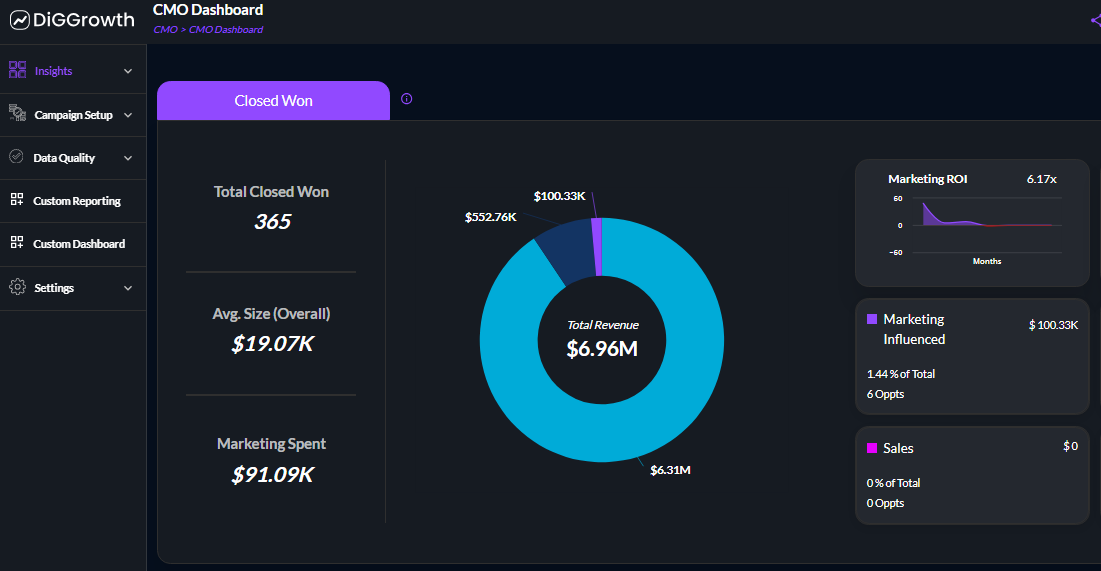
Key features and functions offered by DiGGrowth:
Adobe Analytics is another high-performing marketing analytics tool that offers features centered around in-depth analysis, versatile reporting, and predictive intelligence. It makes it accessible for marketers to lay a reliable foundation for building fruitful customer relationships.

Essentially, the tool focuses on predictive analytics and offers a range of diverse functions and features that are beneficial for businesses making calculative, data-driven, and futuristic predictions.
Key operations offered by Adobe Analytics:
Pro Tip- Using an analytics tool, you must identify KPIs aligning with your business objectives.
This marketing analytics software focuses on providing businesses with a complete idea of their users’ behavior across multiple channels and platforms. It offers various tools and features for developing an overall understanding of the customer journey to boost marketing ROI.
The ultimate goal of this software is to help marketers improve their ROI by utilizing analytical insights, integrations across multiple Google analytics tools and platforms, and optimum data utilization.

Features offered by Google Analytics:
Hubspot is among the most high-end marketing attribution tools, making marketing analytics easy and accessible for marketers. It focuses on turning every customer interaction into a revenue-generation opportunity for businesses. Multi-touch revenue attribution and customer journey analytics reporting also help businesses scale up and leverage growth opportunities.
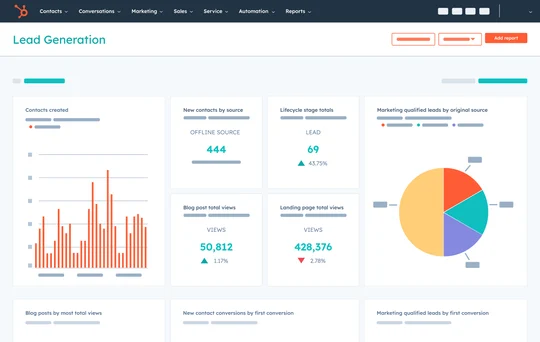
Functions and specifications offered by Hubspot:
Mixpanel is robust marketing analytics software that enables marketers to acquire insights and data across various acquisition channels. It also enables businesses to conduct detailed analyses of the overall customer journey. Moreover, it claims to offer varied and better results than traditional web analytics platforms.
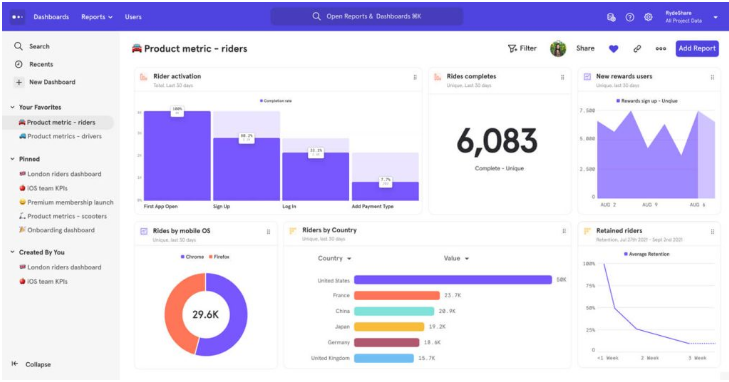
Distinct features offered by Mixpanel:
Also See
Crazy Egg emerges as a viable option in marketing analytics. Despite its popularity as a website optimization tool, it has made itself reasonably known among marketers as reliable marketing analytics software. It offers various features and resources that can be used collectively to manage analytical functions.
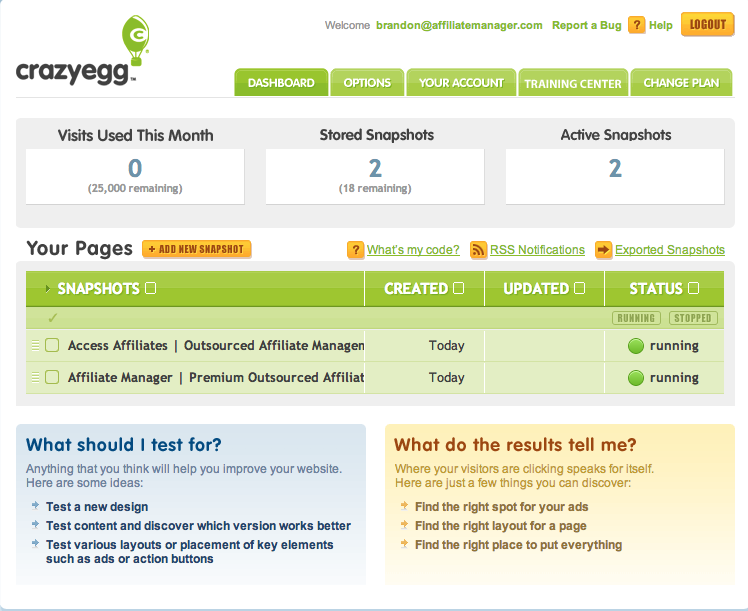
Relevant analytical solutions offered by Crazy Egg:
Marketo Measure (previously known as Bizible) (previously known as Bizible) is a reliable and efficient marketing analytics software greatly trusted and used by marketers worldwide. It offers effective analytical features that promote closer partnerships among internal teams, automation, data-driven decision-making, and more for businesses.
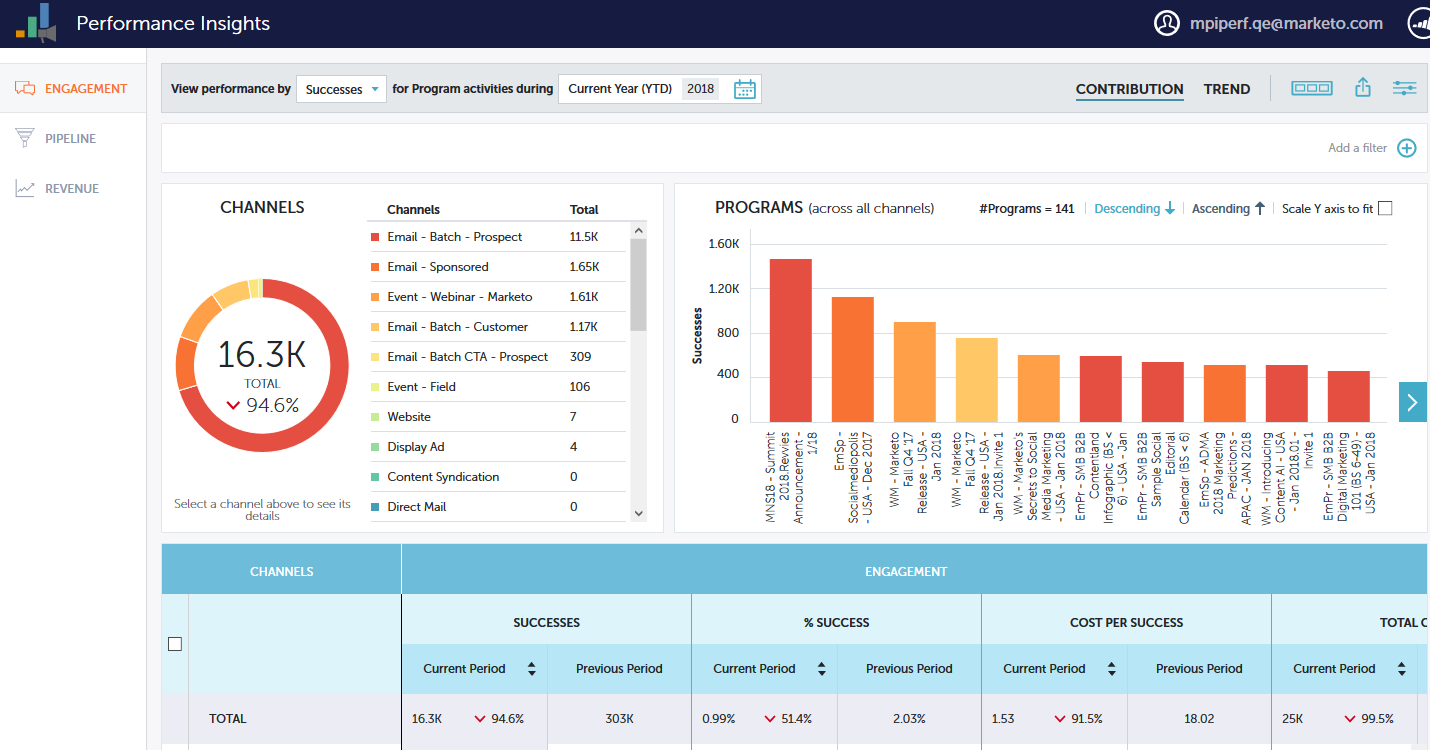
Features offered by Marketo Measure:
Factors.ai is one of the most potent marketing analytics software on this list. This platform’s targeted and diverse features make it a distinguished asset for marketers and data analysts. Businesses trust it for its capability to use information or data effectively to derive key insights and outcomes.
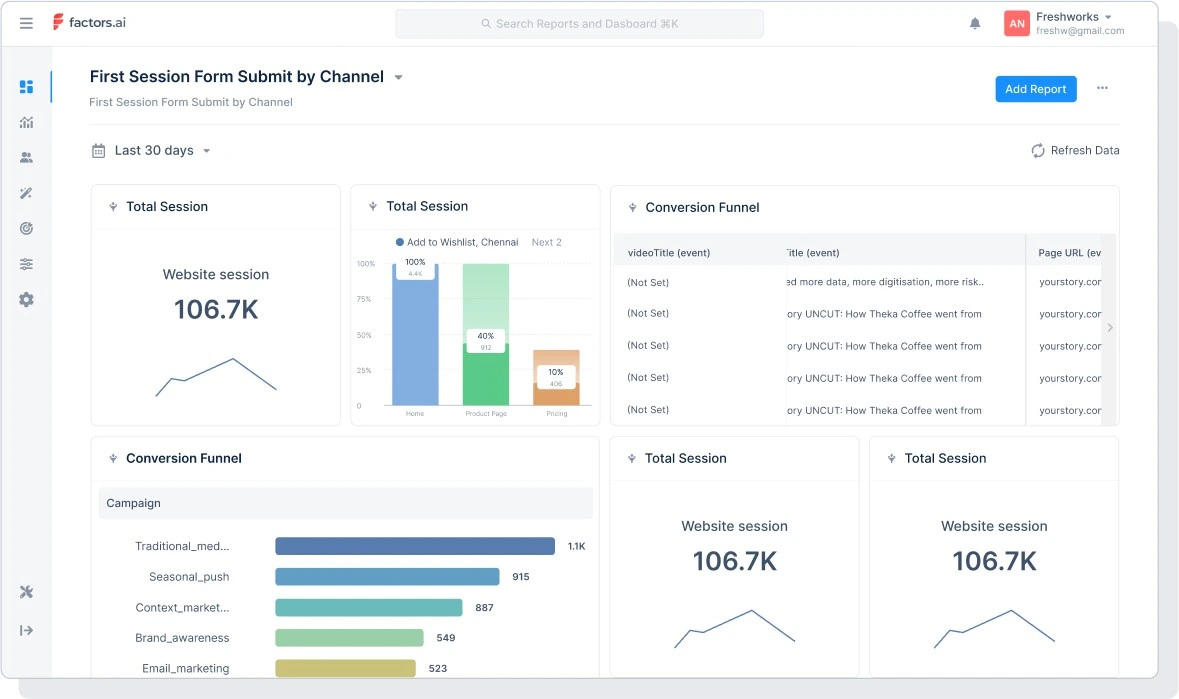
Features offered by Factors.ai:
Implementation Roadmap
Phase 1: Conduct Requirements Assessment: Teams evaluate current analytics maturity, define business goals, and outline success criteria. This step ensures that the selected tool aligns with organizational priorities and long-term growth plans.
Phase 2: Plan Phased Rollout: A phased rollout minimizes disruption and allows teams to validate capabilities in controlled stages. Organizations typically begin with one department or one use case, then expand adoption across channels and teams.
Phase 3: Execute Data Integration: Teams connect data sources such as CRM systems, ad platforms, websites, and product databases. This stage focuses on ensuring data accuracy, mapping fields, resolving inconsistencies, and establishing secure data flows.
Phase 4: Configure Dashboards and Workflows: Teams set up dashboards, custom reports, alerts, and automation rules. This step tailors the tool to specific marketing processes and ensures that stakeholders receive relevant insights.
Phase 5: Drive Change Management: Organizations train teams, educate stakeholders, and establish new workflows to support analytics adoption. Clear communication, documentation, and support resources encourage consistent usage and reduce resistance to change.
Phase 6: Monitor Performance and Optimize: Teams track tool usage, evaluate data quality, refine dashboards, and iterate on integrations. Continuous optimization ensures that the analytics environment evolves with business needs and marketing priorities.
How To Use Marketing Analytics Tools?
Even having the best tools at your immediate disposal can not guarantee the best use and results. The quality of the benefits and results you leverage from marketing analytics tools depends on whether you use them correctly.
So, we are sharing a pro tip to help you make the most of these tools and empower you to use the software or tool(s) mentioned in this blog like an expert.
Importance of Marketing Analytics for Business Growth
In today’s business landscape, relying on guesswork or subjective intuition alone is no longer enough. Marketing analytics plays a role in driving business growth as it provides objective insights into what works and what doesn’t. By analyzing metrics such as customer acquisition costs, conversion rates, campaign performance metrics, and patterns in customer behavior, businesses can identify areas for improvement. Here are some benefits of using marketing analytics software for your business.
- Data-Driven Decision Making
- Enhanced Customer Insights
- Improved ROI
- Competitive Advantage
In the digital age, decisions based on gut feelings are risky. Marketing analytics software provides quantifiable data, helping you understand what works and what doesn’t. It empowers your team to make informed decisions, allocate resources efficiently, and fine-tune your marketing strategies for maximum impact.
Understanding your customers is crucial for business growth. Marketing analytics software provides detailed customer insights, including demographics, behavior patterns, and preferences. With this information, you can tailor your marketing efforts to target the right audience with the right message, resulting in increased engagement and conversions.
Every marketing dollar spent should contribute to your business growth. Marketing analytics software helps you track the performance of your campaigns, allowing you to allocate resources to the most effective strategies. This optimization leads to a better return on investment (ROI) and a healthier bottom line.
Staying ahead of the competition is vital in today’s fast-paced business environment. Marketing analytics software helps you monitor your competitors’ strategies and market trends. With this knowledge, you can quickly adapt your tactics and gain a competitive edge.
Features and Benefits of Marketing Analytics Software
Marketing analytics software is a powerful tool that allows businesses to measure, analyze, and improve their marketing efforts. Here are some key features and the corresponding benefits of using such software:
- Data Integration
- Performance Tracking
- Data Visualization
- Advanced Analytics
Marketing analytics software enables businesses to seamlessly integrate data from various sources like social media platforms, websites, and customer relationship management systems. This holistic view of marketing efforts uncovers correlations and patterns that can inform decision-making.
This software allows businesses to track the real-time performance of their marketing campaigns. Detailed metrics and customizable dashboards provide insights that enable marketers to optimize strategies for achieving ROI.
The software visualizes marketing data through appealing charts, graphs, and marketing reports. It simplifies the understanding of information for decision-making and makes it easier to understand data. It also improves team communication, ensuring everyone is on the same page.
Marketing analytics software utilizes techniques like predictive modeling and machine learning algorithms to uncover hidden patterns and trends. It allows businesses to anticipate customer behavior, optimize marketing campaigns, and stay ahead of competitors.
Performance Measurement and ROI Tracking Using Marketing Analytics Software
Marketing analytics software is essential for measuring and optimizing marketing campaigns by understanding performance indicators (KPIs) and metrics. This software plays a role in tracking and analyzing performance providing businesses with tools and insights.
One advantage of marketing analytics software is its ability to showcase the return on investment (ROI) from marketing efforts. By tracking revenue and conversions attributed to marketing activities, businesses can assess campaign effectiveness and make informed decisions to improve ROI.
In addition, marketing analytics software offers real-time reporting and dashboards, making it easy for businesses to monitor their marketing performance. Analytics tools help businesses effortlessly track metrics like website traffic, conversion rates, customer acquisition costs, and customer lifetime value.
Predictive Modeling in Marketing Analytics Software
Real-time data allows businesses to quickly identify areas for improvement and adjust their marketing strategies to maximize performance.
Predictive modeling is a tool in marketing analytics software. It involves using data and statistical algorithms to predict outcomes. Predictive modeling enables businesses to make data-driven decisions and optimize their marketing strategies.
A significant application of modeling in marketing analytics software is customer segmentation. By analyzing customer behaviors and characteristics, predictive models can identify groups of customers with attributes and behaviors. This information allows businesses to tailor their marketing campaigns and messages to segments, increasing customer engagement and conversion rates.
Another advantage of incorporating modeling into marketing analytics software is the capability to forecast customer lifetime value (CLV). Predictive models consider factors such as customer purchase history, demographics, and interactions with the brand to estimate each customer’s value. This information is invaluable for businesses when effectively identifying customers and allocating marketing resources.
The inclusion of analytics capabilities within marketing analytics software offers benefits. First and foremost, businesses can benefit from modeling in marketing analytics software by gaining accurate insights into customer behavior. It allows them to proactively address customer needs and preferences, increasing customer satisfaction and loyalty.
Additionally, predictive modeling helps businesses uncover hidden patterns and trends in data that may be challenging to identify through methods. Marketing analytics software can provide insights, contributing to more effective marketing strategies by utilizing algorithms.
Cross-Channel and Multi-Device Analytics
Consumers interact with brands across multiple channels and devices in the digital age, rendering traditional analytics insufficient. Today, businesses require sophisticated Marketing Analytics Software that offers robust cross-channel and multi-device analytics to paint a complete picture of the customer journey. Understanding how users switch between channels and devices is crucial for crafting a seamless marketing strategy and delivering personalized experiences.
Cross-Channel Marketing Analytics
With the many available marketing channels, tracking and analyzing how each contributes to your overall strategy is imperative. Cross-channel marketing analytics allow you to monitor performance across different platforms—social media, email, search engines, or offline sources—providing invaluable insights into customer preferences and behavior.
Tracking User Journey Across Devices
As individuals move from desktops to smartphones, tablets, and other Internet-enabled devices, tracking this transition becomes essential. By leveraging analytics that capture the user journey across devices, marketers can create a cohesive narrative of the user’s interaction with the brand, identifying crucial touchpoints influencing the conversion path.
Importance of a Unified Customer View
Developing a unified customer view is an integral component of modern marketing analytics. This comprehensive view consolidates all customer interactions and data points into a single profile. With this insight, marketers can design more effective, targeted campaigns by recognizing each customer’s unique history, preferences, and engagement level. Furthermore, it enables a strategic alignment across different business units, ensuring consistent and coherent messaging.
- Integrates data from various channels for cohesive analytics.
- Provides insights into the cross-device browsing and shopping patterns.
- Enables better attribution modeling and performance analysis.
- Supports hyper-targeted, personalized marketing efforts.
- Empower marketers to deliver a consistent brand experience across all touchpoints.
Cross-channel and multi-device analytics are vital in understanding today’s complex customer journeys. By adopting sophisticated Marketing Analytics Software that provides a 360-degree view of consumer behavior, companies can make data-driven decisions that catapult them ahead of the competition.
Enhancing Lead Management through Analytics
Effective lead management is pivotal to any business seeking to grow its customer base and increase conversions. With the aid of sophisticated Marketing Analytics Software, companies can streamline their lead acquisition strategies and enhance the quality of lead scoring and nurturing processes. Let’s delve into how analytics can transform lead management.
Lead Generation and Scoring
Transitioning from conventional lead generation to methods powered by analytics yields higher-quality prospects. Marketing Analytics Software employs intricate algorithms to score leads based on their online behaviors, demographic data, and engagement levels. It ensures that sales teams focus on the leads most likely to convert into customers.
Integrating Web Analytics and CRM Data
Combining web analytics with Customer Relationship Management (CRM) data creates a comprehensive view of the customer journey. This integration facilitates in-depth insights into how potential customers interact with your brand online, allowing for more accurate and targeted lead-nurturing strategies. Marketers can leverage this data to tailor their communications, offers, and content to move leads effectively through the sales funnel.
Predictive Analytics for Qualifying Leads
Predictive analytics tools built into Marketing Analytics Software enable businesses to identify and qualify the most promising leads. By analyzing past conversion data and identifying trends, the software predicts which current leads are more likely to engage. Companies can use this information to prioritize their sales and marketing resources, focusing on nurturing these high-potential leads.
- Identify high-value leads with predictive modeling.
- Automate lead scoring based on conversion probability.
- Focus on leads with the highest propensity to buy.
In an era where data-driven decision-making is not just an advantage but necessary, Marketing Analytics Software is critical in revolutionizing lead management practices. Businesses equipped with these advanced analytical tools are positioned to realize unprecedented efficiencies and achieve substantial growth in their marketing ROI.
Maximizing ROI with Marketing Analytics
Return on Investment (ROI) is a crucial metric that all marketing leaders scrutinize to ensure their efforts are cost-effective and profitable. With sophisticated Marketing Analytics Software, companies are steering their marketing strategies more precisely toward higher ROI. Let’s delve into how leveraging these analytics tools can significantly enhance the financial outcomes of your marketing initiatives.
Marketing ROI Measurement
Understanding the impact of marketing campaigns on your bottom line is fundamental. Marketing Analytics Software provides various tools to decipher complex data and attribute revenue to specific marketing tactics. It allows businesses to measure ROI with unprecedented accuracy, ensuring that every dollar spent can be accounted for in terms of its contribution to overall success.
Cost per Lead and Customer Acquisition Cost Analysis
An essential aspect of maximizing ROI is reducing the pricing through Cost per Lead (CPL) and Customer Acquisition Cost (CAC). Marketing Analytics Software illuminates pathways to lower these costs by pinpointing the most efficient marketing channels and strategies. By analyzing conversion rates and sales data, these platforms help fine-tune your campaigns to attract high-quality leads at a lower cost, optimizing your marketing budget allocation.
Budget Allocation and Spend Efficiency
Wise budget allocation is the linchpin of marketing efficiency. With real-time data and predictive analytics, Marketing Analytics Software aids in understanding which channels and campaigns warrant increased investment and which should be scaled back. This dynamic approach to budgeting ensures your marketing spend is constantly adjusted for maximum impact and efficiency, avoiding wastage and amplifying ROI.
- Channel Efficacy:
- Spend Agility:
- Strategic Repositioning:
Allocate more funds to high-performing channels based on analytics insights.
Shift budgets swiftly in response to real-time data, staying ahead of market trends.
Reallocate budgets based on season, consumer behavior, and economic shifts.
In conclusion, Marketing Analytics Software is indispensable for businesses seeking to enhance their ROI. It provides the intelligence needed to make informed decisions, optimize marketing spend, and drive conversions. By embracing analytics, companies can ensure their marketing strategies are not just data-driven but also profit-driven.
Selecting the Right Marketing Analytics Software for Your Enterprise
Finding the most suitable marketing analytics software for your enterprise is foundational in leveraging your marketing data to its full potential. The multitude of options available can be overwhelming. Still, the decision-making process can be substantially simplified by clearly understanding your business needs and the following evaluation criteria.
Tool Evaluation Criteria
To ensure you select a solution that meets your enterprise’s requirements, thoroughly assess each marketing analytics product against a set of predetermined criteria:
- Functional Capabilities:
- Customization:
- Integration:
- User Experience:
- Support and Training:
Consider the range of features offered. Does the software provide comprehensive insights across all marketing channels?
Assess the ability to tailor the tool to suit your business processes and reporting needs.
Evaluate how well the software integrates with your organization’s marketing tools and data systems.
The user interface should be intuitive to ensure adoption and consistent use by your team.
To maximize the software’s value, consider the vendor’s customer service reputation and the availability of training resources.
Scalability and Enterprise Needs
As your business grows, your marketing analytics software must be able to scale alongside it:
- Performance:
- Flexibility:
- Cost-Effectiveness:
Ensure the software can handle increasing data without compromising speed or accuracy.
The software should accommodate new marketing channels and customer touchpoints as they emerge.
Evaluate the total cost of ownership, including licensing, implementation, and maintenance over time.
Security and Data Compliance
In the era of heightened data privacy concerns, security cannot be an afterthought:
- Data Protection:
- Regulatory Compliance:
- Data Governance:
The software must have robust security measures to protect sensitive customer data from breaches.
Ensure the tool complies with relevant regulations such as GDPR and CCPA to avoid legal consequences and fines.
The ability to set user permissions and maintain data integrity is essential for enterprise deployment.
Considering these factors will streamline your selection process and lead you to market analytics software that fits your current requirements and supports your enterprise’s future growth and adaptation to the ever-changing digital marketing landscape.
Common Challenges and How to Avoid Failure
Bad Data Quality
Bad data leads to inaccurate insights, flawed decisions, and unreliable reporting. Organizations often struggle with inconsistent data formats, duplicate records, and incomplete fields. To avoid failure, teams must establish strict data governance, validate inputs during integration, and schedule regular data audits. Clear ownership and documentation ensure that data remains accurate, standardized, and trustworthy.
Poor User Adoption
Analytics tools fail when teams do not use them consistently. Lack of training, unclear workflows, and overwhelming feature sets can discourage adoption. To prevent this, organizations must provide structured onboarding, define role-based use cases, and offer continuous support. Teams should demonstrate how analytics connects to daily tasks so that users rely on the tool rather than bypass it.
Siloed Data and Teams
Disconnects between marketing, product, and sales create fragmented insights. Siloed data slows decision making and reduces the value of analytics. Teams can avoid this challenge by integrating platforms, aligning metrics across functions, and promoting cross-team collaboration.
Insufficient Executive Support
Without leadership alignment, analytics initiatives lose momentum. Leaders may prioritize short-term execution over long-term analytics investments. Organizations must secure executive sponsorship, present the business case clearly, and demonstrate how analytics improves revenue, efficiency, and customer experience.
Lack of Continuous Optimization
Implementing analytics is not a one-time project. Tools require updates, refinement, and ongoing monitoring. If teams do not optimize dashboards, integrations, and workflows, performance declines. Regular reviews, feedback loops, and iterative improvements help maintain long-term success.
Looking Ahead: The Future of Marketing Analytics Tools
The landscape of Marketing Analytics Software is continually evolving, with new technologies and regulations shaping how marketers collect and analyze data. By staying informed about the latest trends and anticipating changes, businesses can ensure they are well-equipped to compete in the ever-changing digital marketplace. Let’s explore some key developments that will influence the future of marketing analytics tools.
Machine Learning and AI in Predictive Analytics
Integrating Machine Learning (ML) and Artificial Intelligence (AI) into marketing analytics tools is revolutionizing the accuracy of customer behavior predictions. These technologies facilitate processing massive amounts of data sets to uncover patterns and trends that can forecast future actions with remarkable precision. As ML and AI become more sophisticated, marketing analytics software will become invaluable for businesses looking to optimize their strategies based on actionable insights.
The Evolving Landscape of Privacy and Data Collection
In response to increasing concerns over privacy, the way marketing analytics collect and handle data is changing significantly. Regulations like the GDPR and CCPA have set a new standard for data protection, compelling analytics tools to evolve their data collection methods to ensure user privacy. Marketers must continue to monitor these changes to maintain compliance and sustain consumer trust while gathering the insights necessary for informed decision-making.
Embracing Changes and Innovations in Analytics Software
Staying ahead of the curve requires a proactive approach to embracing new features and innovations in marketing analytics software. From advancements in data visualization to more user-friendly interfaces and integrating various data sources for a more holistic view, analytics tools are becoming more powerful and indispensable. Forward-thinking businesses will not only adapt to these changes but also help to drive innovation by demanding more from their analytics solutions.
- Adaptive Learning:
- Cross-Functional Analytics:
- Customer-Focused Analytics:
Analytics tools must constantly learn from new data to provide updated and relevant insights.
Integrating data from various departments and sources for a comprehensive analysis will be increasingly important.
Tools that prioritize the customer experience by enabling personalized marketing strategies will be paramount.
The future of marketing analytics software is indeed promising, with significant innovations on the horizon that have the potential to transform the way businesses understand their customers and refine their marketing efforts. By staying informed and adaptable, marketers can leverage these tools to forge stronger connections with their audiences and drive sustained growth.
Conclusion
In summary, incorporating modeling into marketing analytics software empowers businesses to make marketing decisions based on data analysis. It enables them to optimize their strategies and deliver personalized experiences to customers. By embracing predictive analytics capabilities, businesses can stay ahead of their competition. Achieve superior marketing outcomes.
The marketing analytics tools mentioned in this blog are exceptionally capable, reliable, and functional. Talk to Us!
You can choose the ones that you find most aligned with your business’s specific needs and requirements. Just write to us at info@diggrowth.com and we’ll get back to you.
Citations
https://www.coursera.org/articles/marketing-analytics
https://matomo.org/blog/2023/10/robust-digital-marketing-analytics/
https://business.adobe.com/products/marketo/bizible.html
https://marketingplatform.google.com/about/analytics/
https://business.adobe.com/products/analytics/adobe-analytics.html
https://www.hubspot.com/
https://mixpanel.com/
https://www.crazyegg.com/
https://www.factor.ai/
Ready to get started?
Increase your marketing ROI by 30% with custom dashboards & reports that present a clear picture of marketing effectiveness
Start Free Trial
Experience Premium Marketing Analytics At Budget-Friendly Pricing.

Learn how you can accurately measure return on marketing investment.
How Predictive AI Will Transform Paid Media Strategy in 2026
Paid media isn’t a channel game anymore, it’s...
Read full post postDon’t Let AI Break Your Brand: What Every CMO Should Know
AI isn’t just another marketing tool. It’s changing...
Read full post postFrom Demos to Deployment: Why MCP Is the Foundation of Agentic AI
A quiet revolution is unfolding in AI. And...
Read full post postFAQ's
Marketing analytics software is the tool or platform marketers use to track the effectiveness and KPIs of the campaigns and strategies implemented by a business for driving more reach, conversions, and revenue.
Various competent and reliable marketing analytics tools like DiGGrowth have been listed in this blog. You can choose the ones you find perfectly aligned with your business objectives.
Marketing data analytics is the insightful and detailed study of the overall performance and impact of a marketing activity or campaign.


